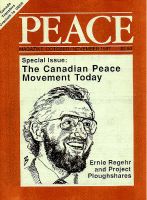
Peace Magazine Oct-Nov 1987, page 12. Some rights reserved.
Search for other articles by David Jackman here
John Peddle hangs up his phone after arranging for five Soviet sailors to visit with a family across town in Cornerbrook, Newfoundland . Phyllis Creighton, a member of the Anglican General Synod, finishes revisions in Toronto on a review of the White Paper on defence ... Ken Epps, a researcher in Waterloo, Ontario, puts the finishing touches on a computer-generated list of arms contractors ... Ellen Gould in Regina mails her report on an address by the Ambassador for Disarmament ... Janet Gear steps into a church hall in Vancouver to attend a meeting with a city-wide disarmament coalition.
Five busy Canadians working for peace. They are part of Project Ploughshares, a nation-wide network of researchers, educators, and political organizers.
Born in 1976 as a research and action project, Ploughshares, under the direction of its two founders, Mennonite writer Ernie Regehr and Quaker activist Murray Thomson, wanted to investigate the links between militarism and underdevelopment in the Third World. This had led Ploughshares through the twisting paths of the international arms trade and back to the security policies of the industrialized world itself. Ploughshares' sponsors include, not just the traditional peace churches, but the Canadian Council of Churches, the mainline Christian denominations, and many major Canadian development agencies. In all, 18 organizations have a place on the Project's national board.
By the late 1970s Ploughshares' investigation of world militarism along with the Canadian public's increasing fear of nuclear war brought about the Organization's second major growth spurt Ploughshares took on scores of local support groups the country. By 1984 there were more than 40 such groups, some church-based, but many more reflecting a wide community involvement. In recognition of this new vitality, representatives from these local groups now sit on Ploughshares' national policy-making board.
Within the peace movement Project Ploughshares is best known as a research organization. Its permanent staff includes experts on Canada's involvement in the arms trade and on this country's direct support of nuclear weapons Systems. In addition, Ploughshares has organized a unique computerized data base that tracks the activities of Canada's more than 2,000 producers of military technology.
Ploughshares' advocacy, directed toward changes in Canadian security policy, is carried out in three ways. First, we maintain regular contact with Parliament and its bureaucracy through the organization's Ottawa Representative, Simon Rosenblum. He maintains a close connection with the formal committees and caucuses as well as attending the many informal occasions at which national decision-making is carried out.
Rosenblum's work paves the way for the other two advocacy routes. With presentations from the project's staff, the leaders of Canada's national churches confer with the country's political leaders regularly. And below this high-level contact is an ongoing dialogue between local Ploughshares groups and their MPs. For example, the Centre-Wellington Ploughshares group held a series of meetings with their local member, Minister of Defence, Perrin Beatty. The comprehensiveness of the group's presentation, which included a full critique of government policy, was a little startling for Beatty. But the Minister replied with a strenuous argument for a beefed-up Canadian defence capacity. Not discouraged, the local group is trying to keep this channel open.

Peace Magazine Oct-Nov 1987, page 12. Some rights reserved.
Search for other articles by David Jackman here